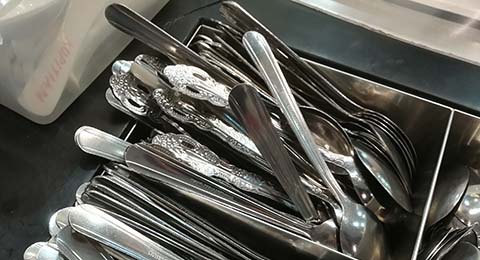
The photo above is of a cutlery tray at an ordinary food court. Those of us familiar with Singapore’s food courts will be able to read significance into the fact that there are two kinds of spoons mixed together. Spoons and forks with flowery handles are usually reserved for halal use; those with plain handles are non-halal. They are supposed to be kept apart and mixing them together even after washing is seen as causing contamination.
So what was going on in this food court?
My eyes scanned the stalls. There was none selling halal food. There were however a couple of vacant stalls with “For rent” signs on them. One can guess what happened. There must have been, previously, at least one halal stall in this food court. It must have gone out of business, and the halal cutlery was then orphaned. Since no business would want to waste assets, the natural thing for the master operator of the food court to do would be to put the flowery utensils to good use.
That the food court had become totally non-halal is not an uncommon observation. Halal stalls seem to have a hard time surviving in “mixed” food courts. Or “mixed” coffee shops, for that matter. This is a trend that reflects a wider one in Singapore’s Muslim community, which in turn is influenced by the broader international Muslim community: a heightened attention to questions of purity, which often manifests as a tendency towards exclusivity.
It sometimes goes to absurd lengths. Last month, there was a Bloomberg story about a Malaysian start-up’s Islamic-complaint web browser.
[SalamWeb] relies on community-vetted content filters that mark web pages as appropriate, neutral or inappropriate, while warning users when they approach sites with gambling or pornography.
It’s worth thinking through what the above initiative means. Instead of the believer using his own intelligence, autonomy and willpower to make “right” choices amidst a world of confusing signals and temptation, the believer is asked to outsource his autonomy to a web browser that makes choices for him. He no longer needs to think through his encounters because every slice of the world presented to him through the browser is pre-certified for him.
An equally fascinating development has been an increasing hypersensitivity towards symbols. “Wrong” symbols are seen as contaminating, and by extension, are viewed as offensive and capable of undermining the faith. Recently, there was the controversy over a “pork dish” advertised in the inflight magazine of Malaysia Airlines. See the story in Yahoo news.

Meanwhile in Singapore, porkers are everywhere, to mark the Year of the Pig (2019)
Someone spotted in the magazine a write-up of a restaurant complete with photographs of a dish or two. Assuming that the meat was pork, a post on social media criticised the airline for offending Islam, the national religion of Malaysia. Despite it turning out that the picture showed a dish of wagyu beef, the airline apologised — for what? — thus cementing the line that its inflight magazine must never mention or depict pork.
Strangely enough, Malaysia Airlines serves alcohol on board its aircraft. How it will respond to a future social media storm over that would be interesting to watch.

Photo from Jakarta Post
In the same month, there was a story in the Jakarta Post about a controversy over how a street junction was paved:
The Surakarta administration in Central Java has finally decided to cover a cross-shaped road mosaic in front of the City Hall with paint following complaints from conservative Muslim groups.
“The administration has met with several religious leaders and came up with a number of solutions. But to prevent the polemic from dragging on, we decided to cover the mosaic with paint,” Surakarta deputy mayor Achmad Purnomo said on Saturday.
Previously, the Surakarta’s Muslim Troops (LUIS) and the Surakarta Syariah Council (DSKS) questioned the design of the mosaic and demanded that the city administration review it.
Read between the lines: despite consulting religious leaders, the latter were not mollified and the city administration caved in.
A tool for political power
A demand for purity and its corollary, a fear of contamination, is in fact a tool for political power. Religious leaders and self-appointed guardians of the faith seize on one tenet of the religion (e.g. avoiding consumption of pork), extend that tenet way beyond its natural boundaries (do not depict pigs or pork!), and demand that state institutions, companies, and society as a whole should comply with their newly-drawn boundaries. Because religion is treated by governments as a sensitive matter, and companies would hardly wish to antagonise their clients (even if it’s just a small number of them), such demands are typically acceded to.
The above-mentioned demands on an airline’s inflight magazine and on a city council’s street paving are really instances of “we’ll show you who’s the boss.”
Even the normalisation of food court exclusivity and the hoped-for normalisation of using only an Islamic-complaint web browser represent attempts by religious leaders or self-appointed guardians to exert power over society. Not every member of the faith will follow, but as more do so, the risk of social shame and ostracism increases for those who do not.
Thus grows the political power of the religiously vocal.

